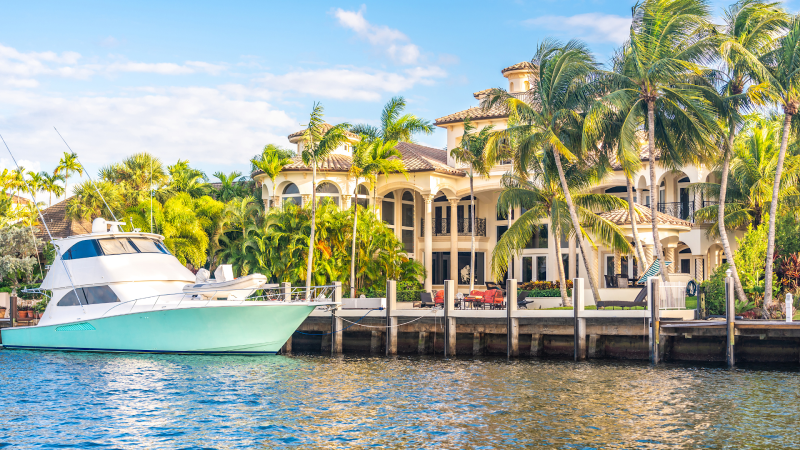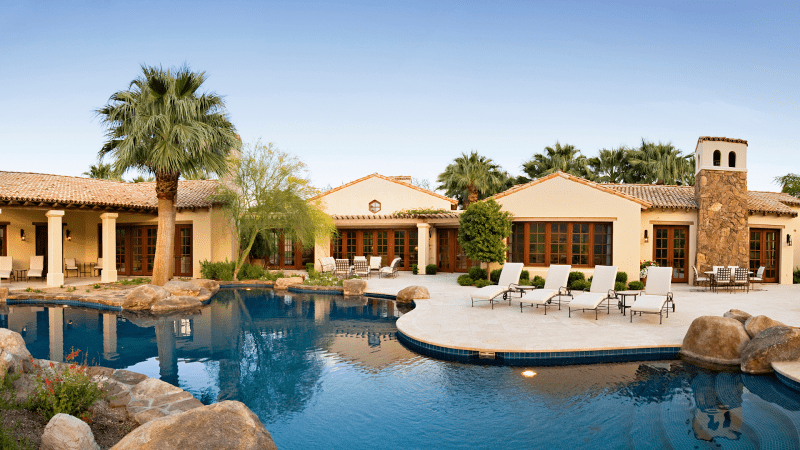Why Luxury Homes Are the Ultimate Real Estate Investment

Are you curious about what distinguishes luxury homes from regular ones? For many, it is not just the eye-catching architecture or prime locations, but also the material and spiritual desirability of a luxurious home.
Do these luxurious homes go beyond their appearances? What makes them sound investment tools, especially given the increased volatility and risk in today’s market?
Market Stability and Resilience

The first reason luxury homes are considered profitable investments is the stability of their market and their ability to withstand crises.
Luxury homes are not quite as touched by varying phases in the real estate market as are other segments; the property might stay or increase in value actually during downturns. This resilience can be attributed to several factors:
Global Demand
Globalization also supports the demand for luxury properties, particularly in developed economies. Many foreign wealthy people seek residences in the most favorable areas, contributing to the robustness of these markets. Cities like New York, London, and Idaho experience significant international demand.
In these prominent locations, investors use technological advancements to explore lucrative opportunities. As they conduct their search, they may unexpectedly come across listings for driggs idaho homes for sale, underscoring the global appeal of luxury real estate. This phenomenon highlights the enduring allure of prestigious properties.
High Net-Worth Buyers
Luxury homes cater to high-income buyers who are less sensitive to market changes. These buyers typically have diversified investment portfolios and other substantial cash sources, allowing them to remain active in the real estate market even during crises.
Limited Supply
Luxury homes are limited because only a few ideal locations are available for building and maintaining quality homes. Their rarity contributes to their longevity, as they are not easily exposed to wear and tear.

Appreciation Potential
Luxury homes are exciting investments because they have a strong history of value appreciation. Historical data shows that the luxury housing market usually experiences higher gains than the broader housing market. Several factors contribute to the appreciation potential of luxury homes:
Desirable Locations
Luxury homes are always located in strategic areas such as beachfronts, business districts, or other prestigious locations. These areas become popular for residential, recreational, or business needs, and the value of the properties rises over the years.
Unique Features and Amenities
Luxury homes can be custom-built with stunning architecture, high-quality materials, and special features like swimming pools, home theaters, and extensive grounds. These features not only make living more enjoyable but also add significant value to the property.
Cultural and Economic Trends
The business practices and cultural trends of a nation can also influence the appreciation of luxury homes. For instance, the trend of working from home has increased the value of scenic and less developed properties as people seek these locations for living.

Rental Income and ROI
Luxury homes are also good investments as they can generate substantial rental income if well located. Luxury rental homes attract clients willing to pay high-end rental charges for the associated prestige and comfort. Several aspects of rental income from luxury homes make them attractive investments:
High Rental Yields
Luxury homes are in high demand and therefore cost more than regular houses. This can lead to substantial rental income and a high ROI.
Seasonal and Short-Term Rentals
Luxury homes can be rented as seasonal or short-term accommodations in popular tourist areas. Companies have made it easier for property owners to tap into this market.
Corporate Rentals
Corporate rentals are another reason luxury properties are in demand; executives and staff often stay in these properties for extended periods. This niche ensures steady returns for investors, allowing them to anticipate consistent revenue.

Intrinsic and Lifestyle Value
Beyond monetary gains, luxury homes offer lifestyle benefits. Owning a luxurious property represents financial value and contributes to happiness, prestige, and self-satisfaction. Here are some aspects of the intrinsic value of luxury homes:
Prestige and Status
A luxury home symbolizes ownership and success. It signifies a high-quality lifestyle and can be a major achievement in someone’s life.
Customization and Personalization
Premium homes often offer customization potential, allowing homeowners to design a home that meets their preferences.
Exclusivity and Privacy
Most of the luxury real estates are situated in secured neighborhoods or areas which is another security advantage to clients. This is preferable, especially amongst influential personalities, who wouldn’t wish to share their information with everyone.

Diversification and Risk Management
Hedge funds can benefit greatly from having luxury real estate as a part of their investment assets since it offers them further diversification. Luxury properties, in particular, offer the following advantages for diversification and risk management:
Low Correlation with Other Asset Classes
Luxury real estate is notably not highly correlated to other types of assets, such as equities and fixed-income investments. This implies that the performance of luxury homes has no significant correlation to other markets and would, therefore, not be easily swayed by an up or downturn in other markets.
Tangible Asset
Real estate investment is different from stock or bond investment, where one can lay his or her physical eyes on the investment. The substances by which communication media are constructed offer a tangibility that is comforting and reassuring.
Inflation Hedge
Luxury homes, real estate for that matter, are usually known to be an inflationary hedge, that is, their price usually increases over time, with inflation. This makes luxury properties a perfect inflation hedge just as ants consider their dowries perfect hedges against the harsh realities of life.

Tax Benefits and Financial Incentives for Luxury Real Estate Investment
| Benefit | Description |
| Mortgage Interest Deductions | Mortgage interest on luxury properties can be deducted from taxable income, reducing the overall tax burden. |
| Depreciation Deductions | Investors can claim depreciation on luxury rental properties, offsetting rental income and reducing taxable income. |
| Capital Gains Tax Exemptions | In some jurisdictions, primary residences can be sold without incurring capital gains tax up to a certain limit, allowing investors to realize substantial gains tax-free. |
| Property Tax Deductions | Property taxes on luxury homes can often be deducted from taxable income, providing further financial benefits. |
Conclusion
Luxury homes can be considered the pearls of real estate investment for several reasons. The market for these currencies is relatively stable and secure, along with great potential for appreciation so they happen to be one of the most effective investments.
Besides the utilitarian economic benefits, luxury homes are symbolic client assets that allow their owners to enjoy a rich and status-oriented life. There are still changes in the market preferences, but luxury real estate is ready to meet them.
FAQs
- What makes luxury homes a safe investment?
The market of luxury homes consists of high-net-worth people, and the stock of such houses remains however low, which adds to their resistance against deterioration in conditions in the market.
- What makes luxury homes appreciate?
Geographical factors, architectural features, smooth finishes, and factors such as cultural trends and probable economic returns are some of the aspects that affect the noble condominiums.
- In what way do luxurious homes attract high rental yields?
Premium real estates have higher points in rental charges, and they are suitable for short-term rentals and corporate and seasonal lettings, which go hand in hand with potentially higher rental returns.

